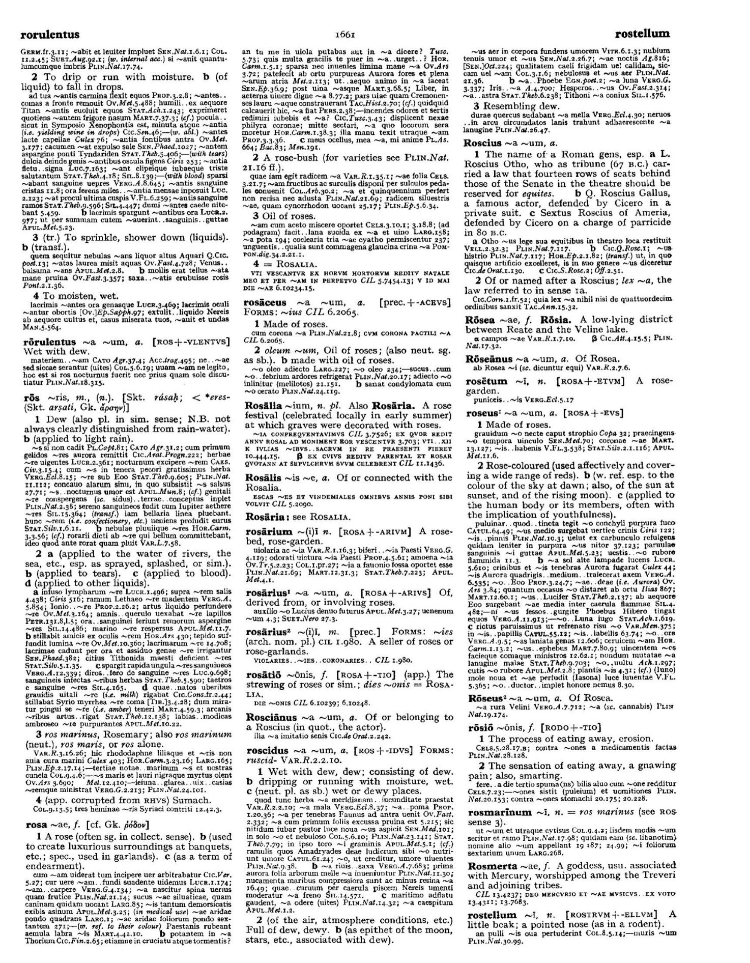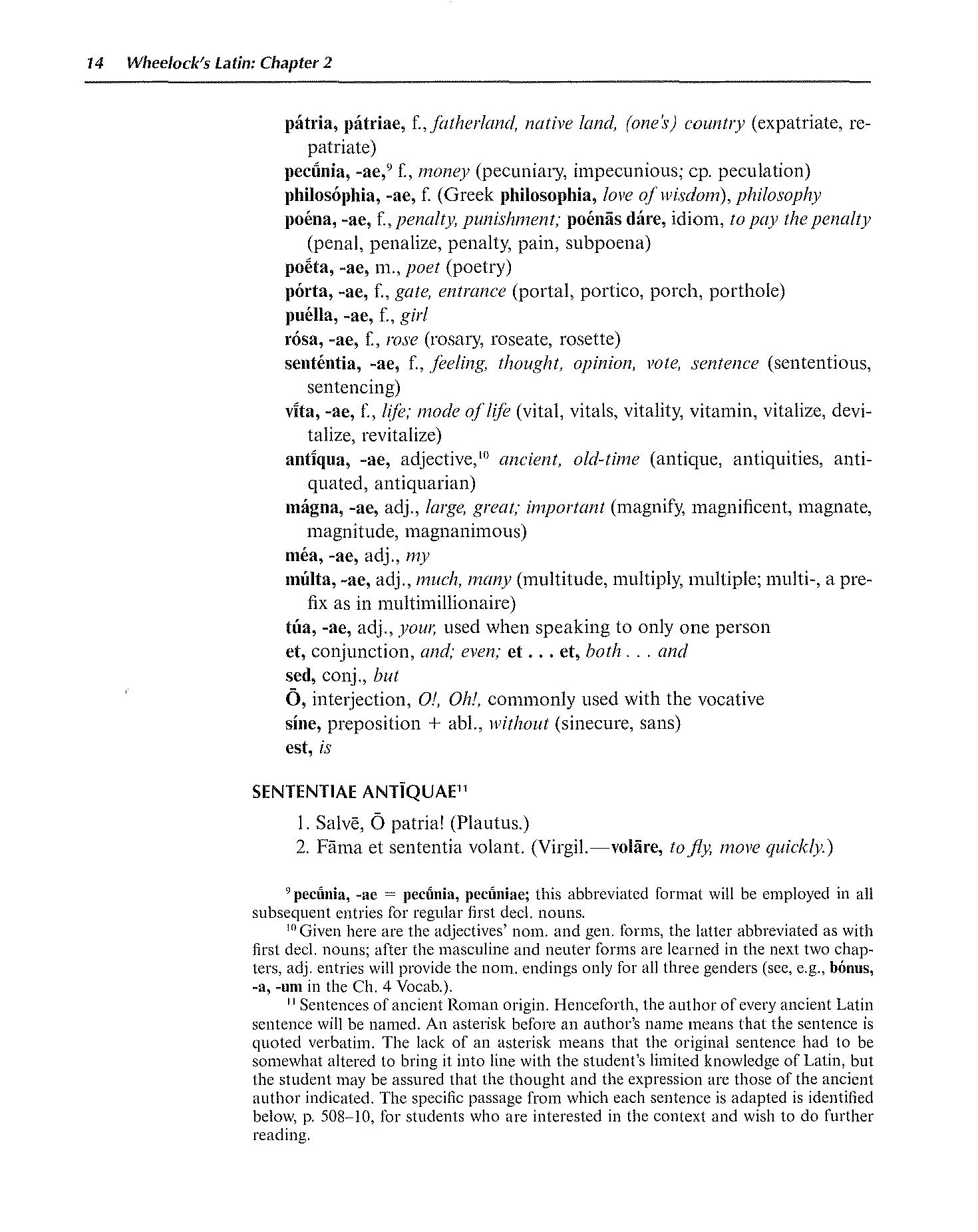
page_listing.tpl
page_subListingDetails.tpl
sub_listingDetails_style1.tpl
sub_listingDetails.title.tpl
rosa rose
rosa is a Latin Noun that primarily means rose.
Definitions for rosa
Wheelock's Latin
Noun
- 1
rose
English derivatives:
rosary roseate rosette
Oxford Latin Dictionary
Noun
- 1
A rose )often sg. in collect. sense). (b) (used to create luxurious sorroundings at banquets, etc.; spec., used in garlands). (c) (as a term of endearment).
- 2
A rose-bush.
- 3
Oil of roses.
Sentences with rosa
Latin to English
Lilia non domina sint magis alba mea; ut Maeotica nix minio si certet Hibero, utque rosae puro lacte natant folia.Compare Lilies are not whiter than my mistress: she is Maeotic snow vying with Iberium minium, or rose leaves floating on the purest milk.
Quis multa gracilis te puer in rosa perfusus liquidis urget odoribus grato, Pyrrha, sub antro? Cui flavam religas comam, simplex munditiis?Compare What slender youth bedewed with liquid odours courts thee on roses in some pleasant cave, Pyrrha, for whom bindst thou in wreaths thy golden hair, plain in thy neatness? (Tr John Milton, "Rendered almost word for word without Rhyme according to the Latin Measure, as near as the language will permit."
Armat spina rosas, mella tegunt apes. crescunt difficili gaudia iurgo accenditque magis, quae refugit, Venus. quod flenti tuleris, plus sapit osculum. [Fescennina de nuptiis Honorii Augusti, IV,10]Compare Thorns arm the rose and bees find a defense for their honey. The refusals of coyness do but increase the joy; the desire for that which flies us is the more inflamed; sweeter is the kiss snatched through tears.
Primus vere rosam atque autumno carpere poma.Compare His the first rose of spring, the earliest apples in autumn.
Declension table for rosa
Cactus2000
| Singular | Plural | |
| Nom. | rosa | rosae |
| Gen. | rosae | rosārum |
| Dat. | rosae | rosīs |
| Acc. | rosam | rosās |
| Abl. | rosā | rosīs |
Data sources
Notes
- Definitions
- Frederick M. Wheelock, Wheelock's Latin, 6th ed., rev. Richard A. LaFleur (New York, NY: HarperCollins Publishers, 2005): 14.
- P. G. W. Glare, Oxford Latin Dictionary, Vols. 1-8 (Oxford: Clarendon Press, 1982): 1661.
- Word frequencies
- Paul B. Diederich, The Frequency of Latin Words and Their Endings, PhD diss., (Columbia University, 1939).
Bibliography
Allen, Joseph H. Allen and Greenough's New Latin Grammar for Schools and Colleges: Founded on Comparative Grammar. Edited by James B. Greenough, George L. Kittredge, Albert A. Howard, and Benjamin L. D'Ooge. Boston, MA: Ginn & Company, 1903.
Crystal, David. A Dictionary of Linguistics and Phonetics. 6th ed. Oxford, UK: Blackwell Publishing, 2008.
Delatte, Louis, Suzanne Govaerts, Joseph Denooz, and Etienne Evrard. Dictionnaire fréquentiel et index inverse de la langue latine [Frequency Dictionary and Inverse Index of the Latin Language]. Liège, Belgium: Laboratoire d'analyse statistique des langues anciennes de l'Université de Liège (L.A.S.L.A.), 1981.
Diederich, Paul B. The Frequency of Latin Words and Their Endings. PhD diss., Columbia University, 1939.
Francese, Christopher. "Latin Core Vocabulary." Dickinson College Commentaries. Last modified 2014. http://dcc.dickinson.edu/latin-vocabulary-list.
Gildersleeve, Basil L., and Gonzales Lodge. Gildersleeve's Latin Grammar: Third Edition, Revised, and Enlarged. 3rd ed. London, England: Macmillan and Co., 1903.
Glare, Peter G.W. Oxford Latin Dictionary. Vols. 1-8. Oxford, England: Clarendon Press, 1982.
Krüger, Bernd. "Latin Conjugation Tables." Cactus2000. Accessed May 5, 2023. https://latin.cactus2000.de/index.en.php.
Pierson, Nick. "Sound of Text." Accessed October 26, 2019. https://soundoftext.com.
Wheelock, Frederick M. Wheelock's Latin. 6th ed. Revised by Richard A. LaFleur. New York, NY: HarperCollins Publishers, 2005.
Wiktionary Contributors. "Victionarium." Wikimedia Foundation, Inc. Updated March 18, 2019. https://la.wiktionary.org/wiki/Victionarium:Pagina_prima.
Citation
Chicago (17th ed.)
Allo Contributors. "rosa, rosae (n.) - Latin Word Definition." Allo Latin Dictionary. Last modified . Accessed February 19, 2026. http://ancientlanguages.org/latin/dictionary/rosa-rosae.
Entry created on . Last updated on .







